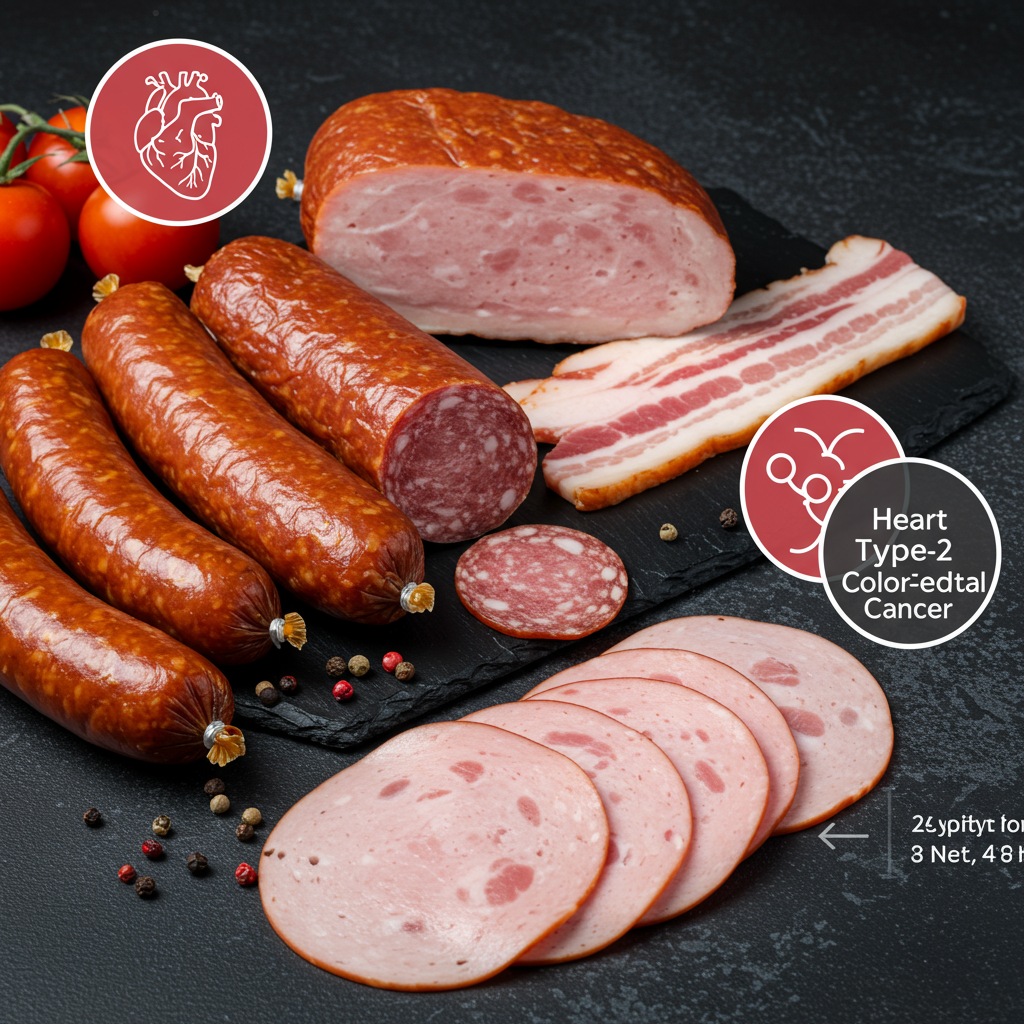Recent research delivers a stark message about processed meat consumption: there may be no safe amount you can eat without increasing your risk of serious chronic diseases. Nutrition experts reacting to a major new study highlight strong evidence linking even small servings to higher rates of type 2 diabetes, colorectal cancer, and heart issues. The same research also flagged concerns about sugary drinks and trans fatty acids.
This comprehensive analysis, published in the journal Nature Medicine on June 30, looked at data from 77 previous studies. Researchers aimed to quantify the link between specific amounts of processed meat, sugar-sweetened beverages, and trans fats in diets and the likelihood of developing common chronic conditions like type 2 diabetes, ischemic heart disease (a major cause of heart attacks), and colorectal cancer.
The lead author, Dr. Demewoz Haile, a research scientist at the Institute for Health Metrics and Evaluation in Seattle, underscored the findings. He stated that habitually eating even small quantities of these items is tied to an increased risk of developing these major diseases. Dr. Haile explicitly suggested these foods should not be part of a daily diet.
Unpacking the Study’s Quantified Risks
The meta-analysis provided specific insights into consumption levels and associated risks. It suggests that the risk isn’t limited to heavy consumers. Even modest amounts show concerning associations.
For processed meats, the study found that consuming just 0.6 to 57 grams daily was linked to an 11% higher likelihood of developing type 2 diabetes. To put that in perspective, one medium hot dog contains roughly 50 grams of processed meat. Eating between 0.78 and 55 grams per day was associated with a 7% rise in colorectal cancer risk. The study defined processed meat broadly as “any meat preserved by smoking, curing, salting or the addition of chemical preservatives.”
Sugar-sweetened beverages also showed troubling links. Daily consumption from 1.5 to 390 grams could elevate the risk of type 2 diabetes by 8%. Drinking between 0 and 365 grams daily was associated with a 2% increase in the risk of ischemic heart disease. This range often includes just one standard 12-ounce soda.
Trans fatty acids, sometimes labeled as partially hydrogenated oils, showed a clear link to heart risk. When these unsaturated fats made up 0.25% to 2.56% of a person’s daily energy intake, they were linked to a 3% greater risk of ischemic heart disease. Sources of these fats can include crackers, cookies, baked goods, frozen pizza, coffee creamer, refrigerated dough, certain margarines, and some fast food items.
Dr. Nita Forouhi, head of nutritional epidemiology at the University of Cambridge, commented on the consistency of the findings. She noted this research reinforces prior studies. It shows that avoiding or minimizing habitual consumption of these foods offers health gains.
Why Even Small Amounts Matter
Dr. Forouhi, who was not involved in the study, emphasized that the data indicates no “safe amount” for processed meat consumption. Risks appeared to increase progressively with higher intake levels. This suggests a threshold may not exist below which there is zero impact.
Dr. Mingyang Song, an associate professor at Harvard T.H. Chan School of Public Health, echoed this point. Dr. Song was also not involved in the research. He acknowledged that the percentage increases might seem modest at first glance. However, he stressed the remarkable consistency and strength of the association seen even at lower consumption levels.
The study used a “burden-of-proof” method. This newer form of meta-analysis doesn’t just quantify associations across multiple studies. It also evaluates the quality of each included study. Dr. Song noted this method tends to produce very conservative results. Yet, despite this, the strong links persisted.
Understanding the Potential Biological Links
Scientists point to several reasons why these foods might increase disease risk. Processed meats, like bacon, sausages, salami, and some burgers, along with sugary drinks, can promote inflammation in the body. Chronic inflammation is a known contributor to many chronic diseases.
Processed meats often contain nitrites. These chemicals are used for curing and preserving. In the stomach, nitrites can convert into carcinogenic nitrosamines. These compounds are known cancer-causing agents.
Sugar-sweetened beverages deliver large amounts of sugar rapidly. This can lead to weight gain. It also negatively impacts metabolic pathways crucial for regulating blood sugar and fats, increasing the risk of type 2 diabetes and heart disease.
Trans fatty acids harm cholesterol levels. They lower beneficial HDL cholesterol and raise harmful LDL cholesterol. This profile is strongly linked to plaque buildup in arteries, a primary cause of heart disease.
Acknowledging the Nuances and Limitations
It’s crucial to understand that this type of study shows association, not direct causation. Observational studies like those analyzed can identify links. They cannot definitively prove that eating these foods causes the diseases. Dr. Gunter Kuhnle, a professor of nutrition and food science at the University of Reading, highlighted this limitation. Dr. Kuhnle was not involved in the research.
Dietary studies often rely on people recalling what they ate. This introduces the possibility of memory errors or misreporting. Dr. Kuhnle pointed out that even sophisticated analytical techniques cannot fully overcome this challenge inherent in nutritional epidemiology. The external summary also noted that many included studies only measured diet at one point in time. This may not reflect long-term eating habits.
The external summary also mentioned caveats from external experts. Dr. Nick Norwitz, a clinical researcher not involved in the study, agreed that the analysis showed a “relatively consistent association.” However, he emphasized that the evidence quality was graded as “weak” in the study’s abstract. He also noted that grouping diverse foods (like different types of processed meat) is a weakness. Different processing methods might have different health effects.
Furthermore, people who frequently consume processed meats, sugary drinks, and trans fats may also have other lifestyle risk factors. These can include smoking, lack of exercise, socioeconomic factors like education and income, chronic stress, and limited healthcare access. Dr. Kuhnle noted that it’s very difficult to disentangle the effects of diet from these other variables.
Moving Forward: What to Do
While the study doesn’t prove causation, it strongly suggests reducing consumption of these foods is a good strategy for lowering disease risk. Dr. Song indicated that reducing intake is advisable based on the data.
Experts recommend focusing on a balanced, varied diet. Avoid excess intake of any single food group, particularly processed items. Dr. Kuhnle suggested cutting back significantly if you consume many sugary drinks. Minimizing excess processed meats is also prudent. While less common now, avoiding hydrogenated fats is still a good idea where possible.
Dr. Kuhnle offered practical advice: “The goal shouldn’t be perfection but rather a healthy and sensible dietary pattern that allows room for enjoyment.”
Focusing on what to add to your diet is equally important. Dr. Forouhi highlighted that broader research supports dietary patterns rich in fruits, vegetables, whole grains, legumes, nuts, and fermented dairy like yogurt. These overall patterns are linked to better health and longevity.
Ultimately, experts advise against panicking. Food plays a significant role in culture, pleasure, and social life. Reducing it solely to health risks misses this larger picture. However, making informed choices based on the growing body of evidence is essential for long-term well-being.
Frequently Asked Questions
What health risks are linked to processed meat according to this new study?
The recent meta-analysis found a link between processed meat consumption and increased risk for several major chronic diseases. Specifically, it showed associations with higher rates of type 2 diabetes, colorectal cancer, and ischemic heart disease. The study indicated these risks increase even with relatively small daily amounts.
What foods are considered processed meats based on this research?
In this study, processed meat was defined broadly. It included any meat preserved through methods like smoking, curing, salting, or adding chemical preservatives. Common examples that fit this description include bacon, sausages, hot dogs, ham, salami, and some pre-packaged burgers.
How much processed meat is considered safe to eat based on the study’s findings?
According to the analysis, the evidence suggests there is “no safe amount” of processed meat for habitual consumption regarding increased risk of the studied diseases. Even consuming amounts equivalent to part or all of a single hot dog per day was associated with higher risks, indicating that any regular intake might contribute negatively to health outcomes.
—



